Comparing Health Outcomes: Organic Food and Conventional Food
VerifiedAdded on 2023/05/29
|7
|1896
|390
Essay
AI Summary
This essay provides a comprehensive overview of the health impacts of organic versus conventional foods, arguing that organic food consumption is generally better for overall consumer health. It summarizes three articles, highlighting that organic foods are often more nutritious and have lower pesticide residues compared to conventional foods. The essay discusses how consumers of organic food tend to have better dietary patterns and reduced risks of certain diseases. It also touches on the importance of social well-being in food choices and the potential health risks associated with pesticide exposure from conventional food production. Ultimately, the essay concludes that the avoidance of pesticides and the higher nutritional content of organic foods offer significant health benefits over conventionally produced foods.
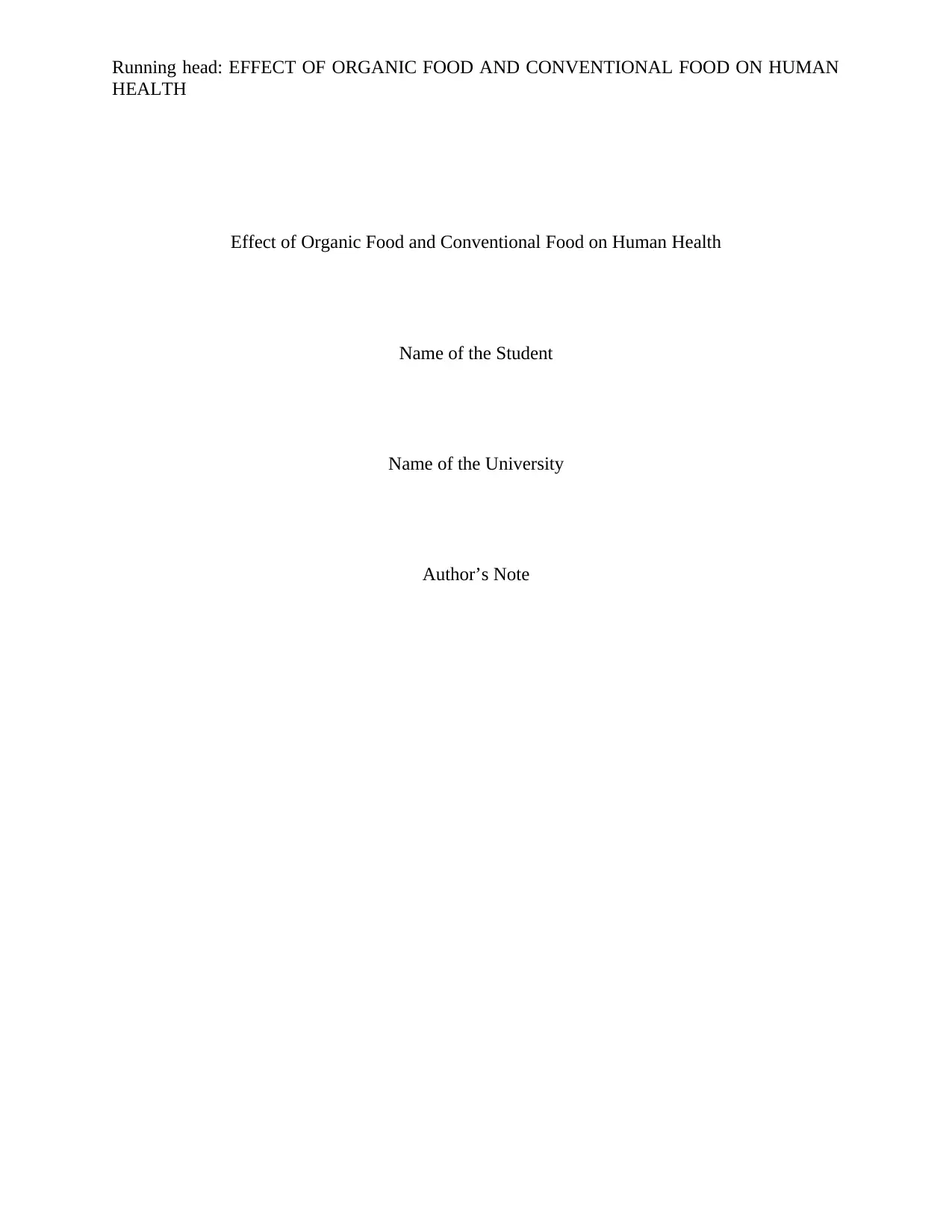
Running head: EFFECT OF ORGANIC FOOD AND CONVENTIONAL FOOD ON HUMAN
HEALTH
Effect of Organic Food and Conventional Food on Human Health
Name of the Student
Name of the University
Author’s Note
HEALTH
Effect of Organic Food and Conventional Food on Human Health
Name of the Student
Name of the University
Author’s Note
Paraphrase This Document
Need a fresh take? Get an instant paraphrase of this document with our AI Paraphraser
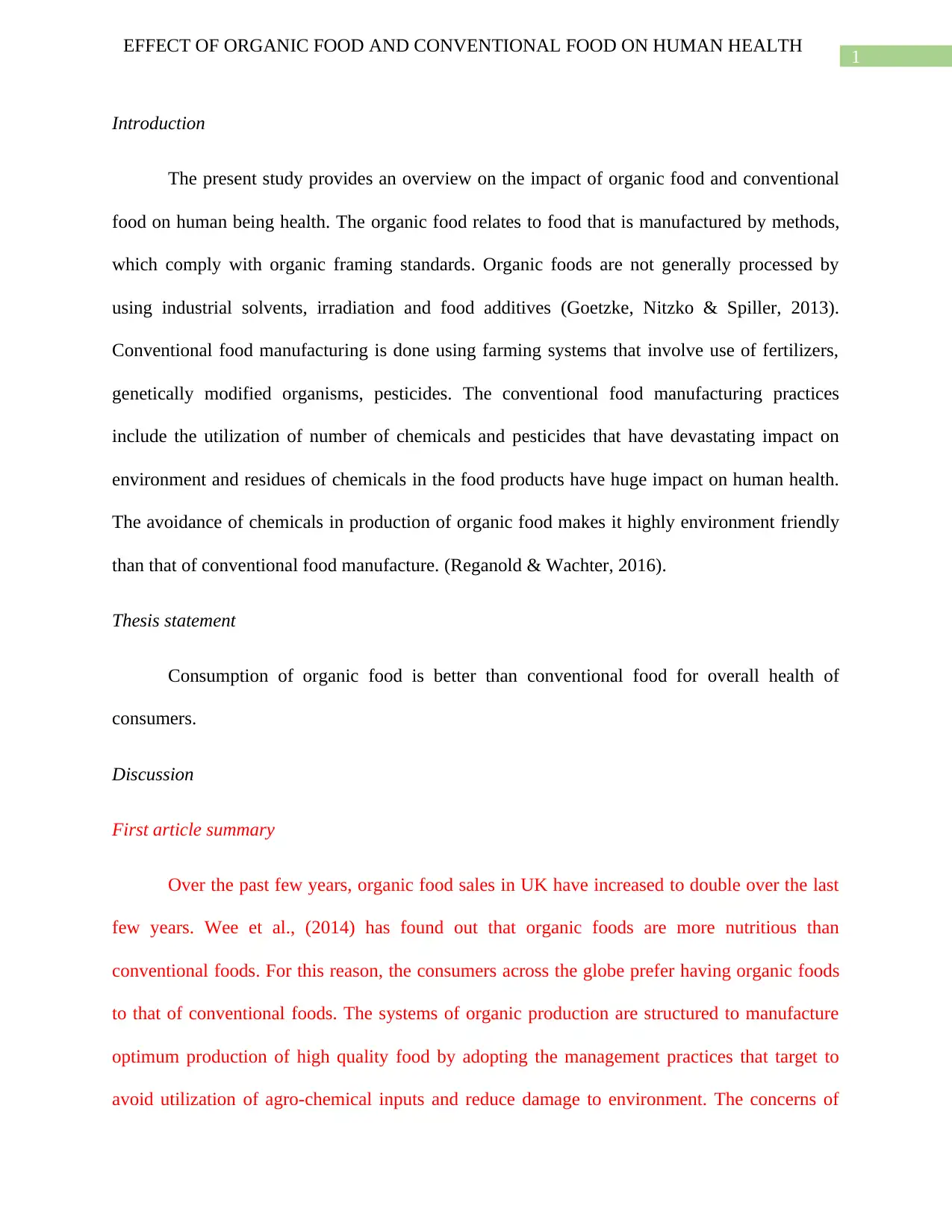
1
EFFECT OF ORGANIC FOOD AND CONVENTIONAL FOOD ON HUMAN HEALTH
Introduction
The present study provides an overview on the impact of organic food and conventional
food on human being health. The organic food relates to food that is manufactured by methods,
which comply with organic framing standards. Organic foods are not generally processed by
using industrial solvents, irradiation and food additives (Goetzke, Nitzko & Spiller, 2013).
Conventional food manufacturing is done using farming systems that involve use of fertilizers,
genetically modified organisms, pesticides. The conventional food manufacturing practices
include the utilization of number of chemicals and pesticides that have devastating impact on
environment and residues of chemicals in the food products have huge impact on human health.
The avoidance of chemicals in production of organic food makes it highly environment friendly
than that of conventional food manufacture. (Reganold & Wachter, 2016).
Thesis statement
Consumption of organic food is better than conventional food for overall health of
consumers.
Discussion
First article summary
Over the past few years, organic food sales in UK have increased to double over the last
few years. Wee et al., (2014) has found out that organic foods are more nutritious than
conventional foods. For this reason, the consumers across the globe prefer having organic foods
to that of conventional foods. The systems of organic production are structured to manufacture
optimum production of high quality food by adopting the management practices that target to
avoid utilization of agro-chemical inputs and reduce damage to environment. The concerns of
EFFECT OF ORGANIC FOOD AND CONVENTIONAL FOOD ON HUMAN HEALTH
Introduction
The present study provides an overview on the impact of organic food and conventional
food on human being health. The organic food relates to food that is manufactured by methods,
which comply with organic framing standards. Organic foods are not generally processed by
using industrial solvents, irradiation and food additives (Goetzke, Nitzko & Spiller, 2013).
Conventional food manufacturing is done using farming systems that involve use of fertilizers,
genetically modified organisms, pesticides. The conventional food manufacturing practices
include the utilization of number of chemicals and pesticides that have devastating impact on
environment and residues of chemicals in the food products have huge impact on human health.
The avoidance of chemicals in production of organic food makes it highly environment friendly
than that of conventional food manufacture. (Reganold & Wachter, 2016).
Thesis statement
Consumption of organic food is better than conventional food for overall health of
consumers.
Discussion
First article summary
Over the past few years, organic food sales in UK have increased to double over the last
few years. Wee et al., (2014) has found out that organic foods are more nutritious than
conventional foods. For this reason, the consumers across the globe prefer having organic foods
to that of conventional foods. The systems of organic production are structured to manufacture
optimum production of high quality food by adopting the management practices that target to
avoid utilization of agro-chemical inputs and reduce damage to environment. The concerns of
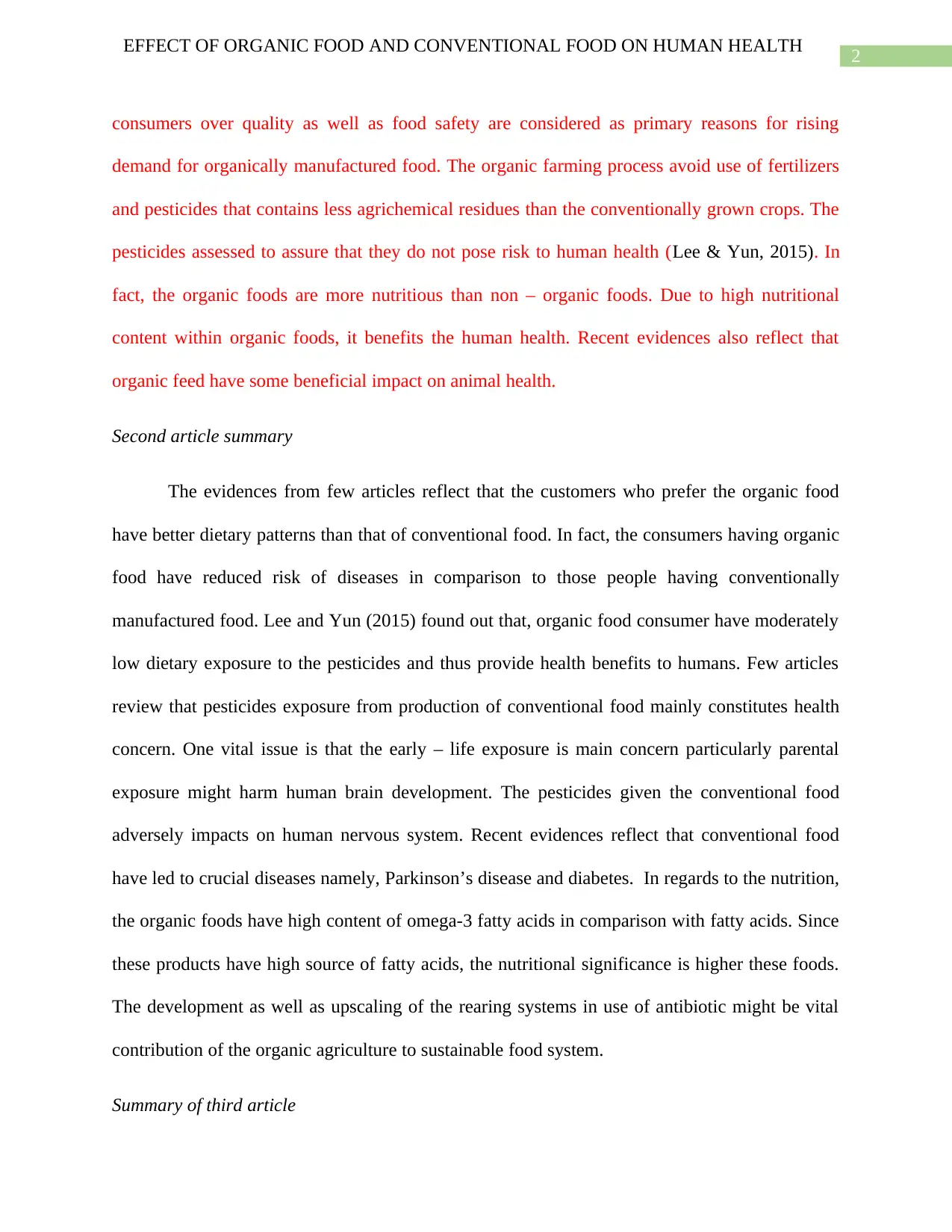
2
EFFECT OF ORGANIC FOOD AND CONVENTIONAL FOOD ON HUMAN HEALTH
consumers over quality as well as food safety are considered as primary reasons for rising
demand for organically manufactured food. The organic farming process avoid use of fertilizers
and pesticides that contains less agrichemical residues than the conventionally grown crops. The
pesticides assessed to assure that they do not pose risk to human health (Lee & Yun, 2015). In
fact, the organic foods are more nutritious than non – organic foods. Due to high nutritional
content within organic foods, it benefits the human health. Recent evidences also reflect that
organic feed have some beneficial impact on animal health.
Second article summary
The evidences from few articles reflect that the customers who prefer the organic food
have better dietary patterns than that of conventional food. In fact, the consumers having organic
food have reduced risk of diseases in comparison to those people having conventionally
manufactured food. Lee and Yun (2015) found out that, organic food consumer have moderately
low dietary exposure to the pesticides and thus provide health benefits to humans. Few articles
review that pesticides exposure from production of conventional food mainly constitutes health
concern. One vital issue is that the early – life exposure is main concern particularly parental
exposure might harm human brain development. The pesticides given the conventional food
adversely impacts on human nervous system. Recent evidences reflect that conventional food
have led to crucial diseases namely, Parkinson’s disease and diabetes. In regards to the nutrition,
the organic foods have high content of omega-3 fatty acids in comparison with fatty acids. Since
these products have high source of fatty acids, the nutritional significance is higher these foods.
The development as well as upscaling of the rearing systems in use of antibiotic might be vital
contribution of the organic agriculture to sustainable food system.
Summary of third article
EFFECT OF ORGANIC FOOD AND CONVENTIONAL FOOD ON HUMAN HEALTH
consumers over quality as well as food safety are considered as primary reasons for rising
demand for organically manufactured food. The organic farming process avoid use of fertilizers
and pesticides that contains less agrichemical residues than the conventionally grown crops. The
pesticides assessed to assure that they do not pose risk to human health (Lee & Yun, 2015). In
fact, the organic foods are more nutritious than non – organic foods. Due to high nutritional
content within organic foods, it benefits the human health. Recent evidences also reflect that
organic feed have some beneficial impact on animal health.
Second article summary
The evidences from few articles reflect that the customers who prefer the organic food
have better dietary patterns than that of conventional food. In fact, the consumers having organic
food have reduced risk of diseases in comparison to those people having conventionally
manufactured food. Lee and Yun (2015) found out that, organic food consumer have moderately
low dietary exposure to the pesticides and thus provide health benefits to humans. Few articles
review that pesticides exposure from production of conventional food mainly constitutes health
concern. One vital issue is that the early – life exposure is main concern particularly parental
exposure might harm human brain development. The pesticides given the conventional food
adversely impacts on human nervous system. Recent evidences reflect that conventional food
have led to crucial diseases namely, Parkinson’s disease and diabetes. In regards to the nutrition,
the organic foods have high content of omega-3 fatty acids in comparison with fatty acids. Since
these products have high source of fatty acids, the nutritional significance is higher these foods.
The development as well as upscaling of the rearing systems in use of antibiotic might be vital
contribution of the organic agriculture to sustainable food system.
Summary of third article
⊘ This is a preview!⊘
Do you want full access?
Subscribe today to unlock all pages.

Trusted by 1+ million students worldwide
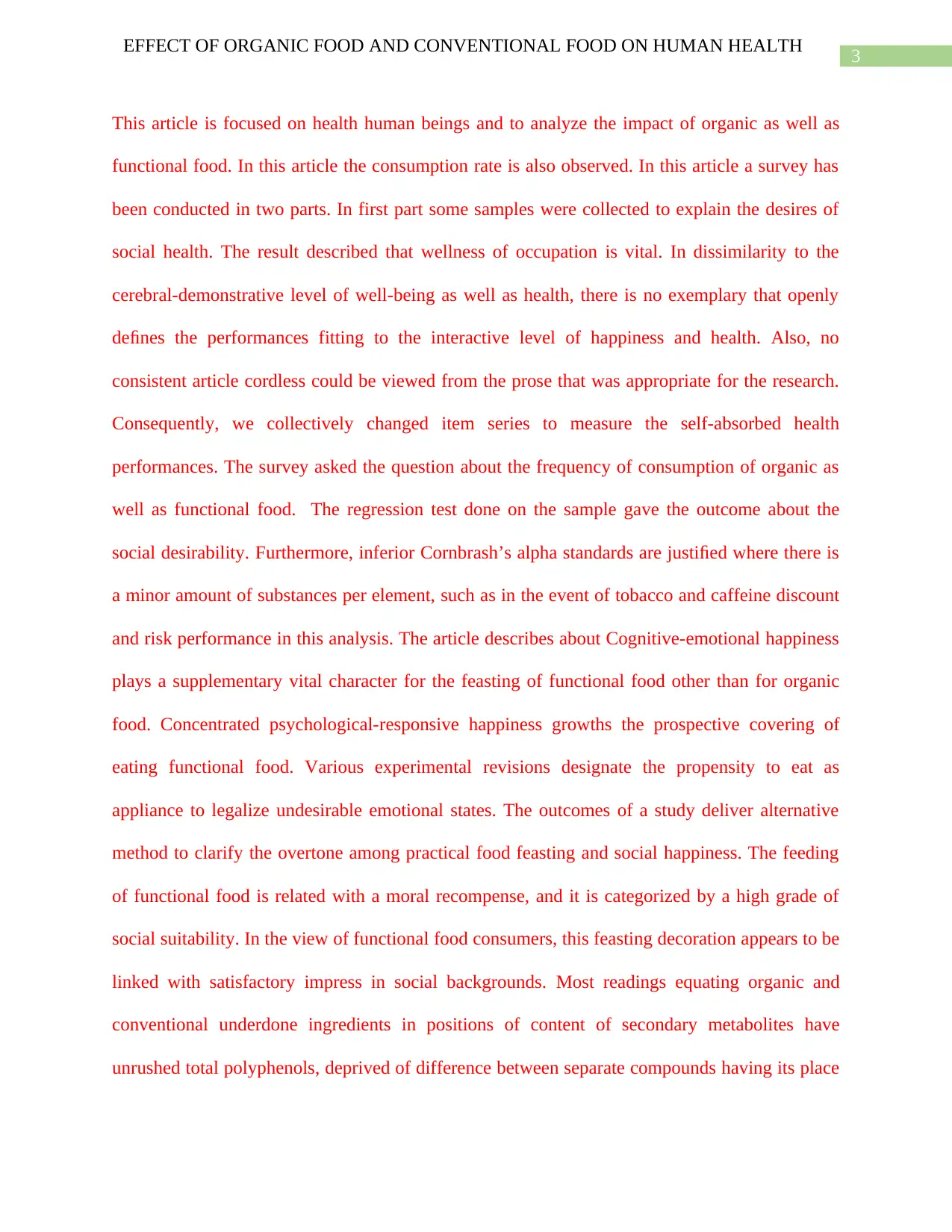
3
EFFECT OF ORGANIC FOOD AND CONVENTIONAL FOOD ON HUMAN HEALTH
This article is focused on health human beings and to analyze the impact of organic as well as
functional food. In this article the consumption rate is also observed. In this article a survey has
been conducted in two parts. In first part some samples were collected to explain the desires of
social health. The result described that wellness of occupation is vital. In dissimilarity to the
cerebral-demonstrative level of well-being as well as health, there is no exemplary that openly
defines the performances fitting to the interactive level of happiness and health. Also, no
consistent article cordless could be viewed from the prose that was appropriate for the research.
Consequently, we collectively changed item series to measure the self-absorbed health
performances. The survey asked the question about the frequency of consumption of organic as
well as functional food. The regression test done on the sample gave the outcome about the
social desirability. Furthermore, inferior Cornbrash’s alpha standards are justified where there is
a minor amount of substances per element, such as in the event of tobacco and caffeine discount
and risk performance in this analysis. The article describes about Cognitive-emotional happiness
plays a supplementary vital character for the feasting of functional food other than for organic
food. Concentrated psychological-responsive happiness growths the prospective covering of
eating functional food. Various experimental revisions designate the propensity to eat as
appliance to legalize undesirable emotional states. The outcomes of a study deliver alternative
method to clarify the overtone among practical food feasting and social happiness. The feeding
of functional food is related with a moral recompense, and it is categorized by a high grade of
social suitability. In the view of functional food consumers, this feasting decoration appears to be
linked with satisfactory impress in social backgrounds. Most readings equating organic and
conventional underdone ingredients in positions of content of secondary metabolites have
unrushed total polyphenols, deprived of difference between separate compounds having its place
EFFECT OF ORGANIC FOOD AND CONVENTIONAL FOOD ON HUMAN HEALTH
This article is focused on health human beings and to analyze the impact of organic as well as
functional food. In this article the consumption rate is also observed. In this article a survey has
been conducted in two parts. In first part some samples were collected to explain the desires of
social health. The result described that wellness of occupation is vital. In dissimilarity to the
cerebral-demonstrative level of well-being as well as health, there is no exemplary that openly
defines the performances fitting to the interactive level of happiness and health. Also, no
consistent article cordless could be viewed from the prose that was appropriate for the research.
Consequently, we collectively changed item series to measure the self-absorbed health
performances. The survey asked the question about the frequency of consumption of organic as
well as functional food. The regression test done on the sample gave the outcome about the
social desirability. Furthermore, inferior Cornbrash’s alpha standards are justified where there is
a minor amount of substances per element, such as in the event of tobacco and caffeine discount
and risk performance in this analysis. The article describes about Cognitive-emotional happiness
plays a supplementary vital character for the feasting of functional food other than for organic
food. Concentrated psychological-responsive happiness growths the prospective covering of
eating functional food. Various experimental revisions designate the propensity to eat as
appliance to legalize undesirable emotional states. The outcomes of a study deliver alternative
method to clarify the overtone among practical food feasting and social happiness. The feeding
of functional food is related with a moral recompense, and it is categorized by a high grade of
social suitability. In the view of functional food consumers, this feasting decoration appears to be
linked with satisfactory impress in social backgrounds. Most readings equating organic and
conventional underdone ingredients in positions of content of secondary metabolites have
unrushed total polyphenols, deprived of difference between separate compounds having its place
Paraphrase This Document
Need a fresh take? Get an instant paraphrase of this document with our AI Paraphraser
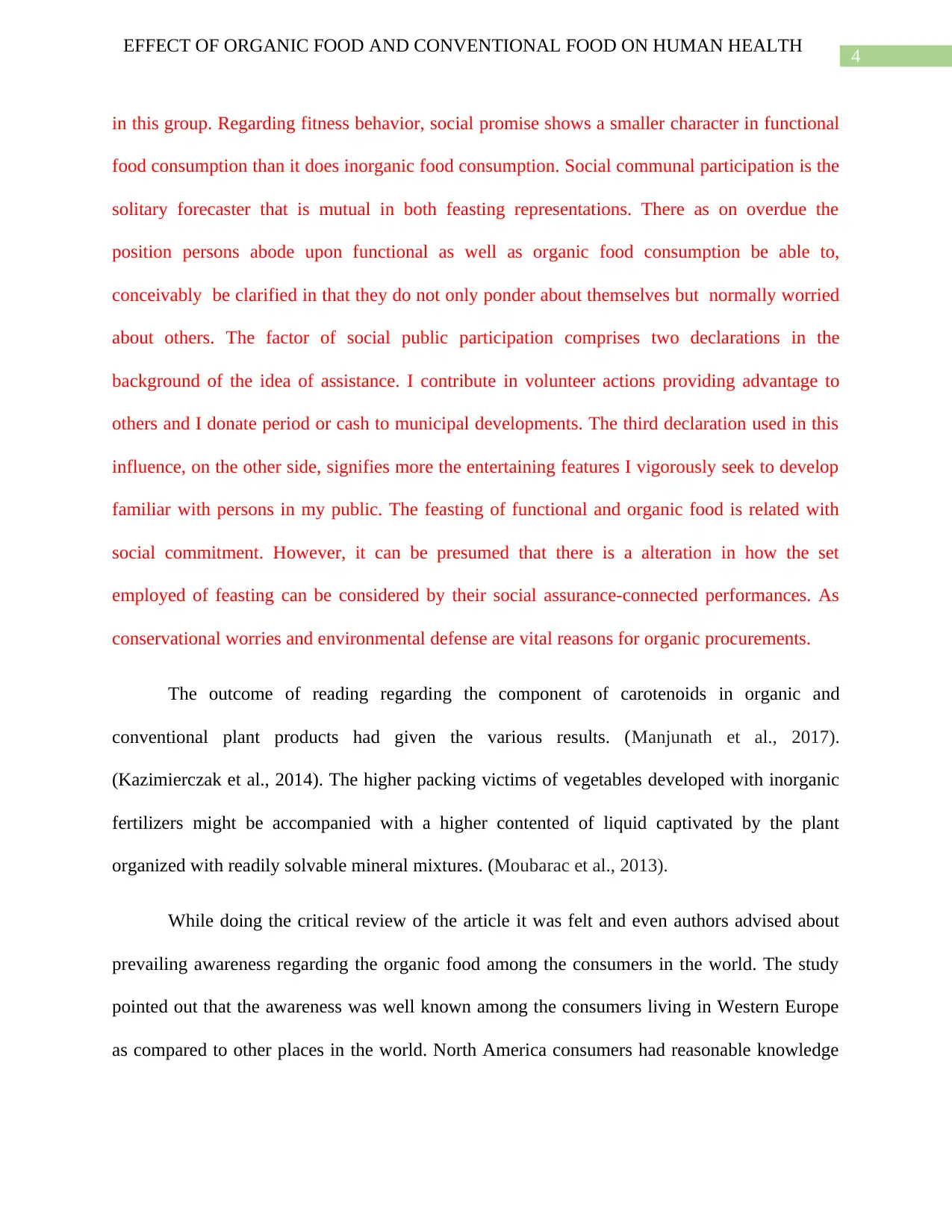
4
EFFECT OF ORGANIC FOOD AND CONVENTIONAL FOOD ON HUMAN HEALTH
in this group. Regarding fitness behavior, social promise shows a smaller character in functional
food consumption than it does inorganic food consumption. Social communal participation is the
solitary forecaster that is mutual in both feasting representations. There as on overdue the
position persons abode upon functional as well as organic food consumption be able to,
conceivably be clarified in that they do not only ponder about themselves but normally worried
about others. The factor of social public participation comprises two declarations in the
background of the idea of assistance. I contribute in volunteer actions providing advantage to
others and I donate period or cash to municipal developments. The third declaration used in this
influence, on the other side, signifies more the entertaining features I vigorously seek to develop
familiar with persons in my public. The feasting of functional and organic food is related with
social commitment. However, it can be presumed that there is a alteration in how the set
employed of feasting can be considered by their social assurance-connected performances. As
conservational worries and environmental defense are vital reasons for organic procurements.
The outcome of reading regarding the component of carotenoids in organic and
conventional plant products had given the various results. (Manjunath et al., 2017).
(Kazimierczak et al., 2014). The higher packing victims of vegetables developed with inorganic
fertilizers might be accompanied with a higher contented of liquid captivated by the plant
organized with readily solvable mineral mixtures. (Moubarac et al., 2013).
While doing the critical review of the article it was felt and even authors advised about
prevailing awareness regarding the organic food among the consumers in the world. The study
pointed out that the awareness was well known among the consumers living in Western Europe
as compared to other places in the world. North America consumers had reasonable knowledge
EFFECT OF ORGANIC FOOD AND CONVENTIONAL FOOD ON HUMAN HEALTH
in this group. Regarding fitness behavior, social promise shows a smaller character in functional
food consumption than it does inorganic food consumption. Social communal participation is the
solitary forecaster that is mutual in both feasting representations. There as on overdue the
position persons abode upon functional as well as organic food consumption be able to,
conceivably be clarified in that they do not only ponder about themselves but normally worried
about others. The factor of social public participation comprises two declarations in the
background of the idea of assistance. I contribute in volunteer actions providing advantage to
others and I donate period or cash to municipal developments. The third declaration used in this
influence, on the other side, signifies more the entertaining features I vigorously seek to develop
familiar with persons in my public. The feasting of functional and organic food is related with
social commitment. However, it can be presumed that there is a alteration in how the set
employed of feasting can be considered by their social assurance-connected performances. As
conservational worries and environmental defense are vital reasons for organic procurements.
The outcome of reading regarding the component of carotenoids in organic and
conventional plant products had given the various results. (Manjunath et al., 2017).
(Kazimierczak et al., 2014). The higher packing victims of vegetables developed with inorganic
fertilizers might be accompanied with a higher contented of liquid captivated by the plant
organized with readily solvable mineral mixtures. (Moubarac et al., 2013).
While doing the critical review of the article it was felt and even authors advised about
prevailing awareness regarding the organic food among the consumers in the world. The study
pointed out that the awareness was well known among the consumers living in Western Europe
as compared to other places in the world. North America consumers had reasonable knowledge
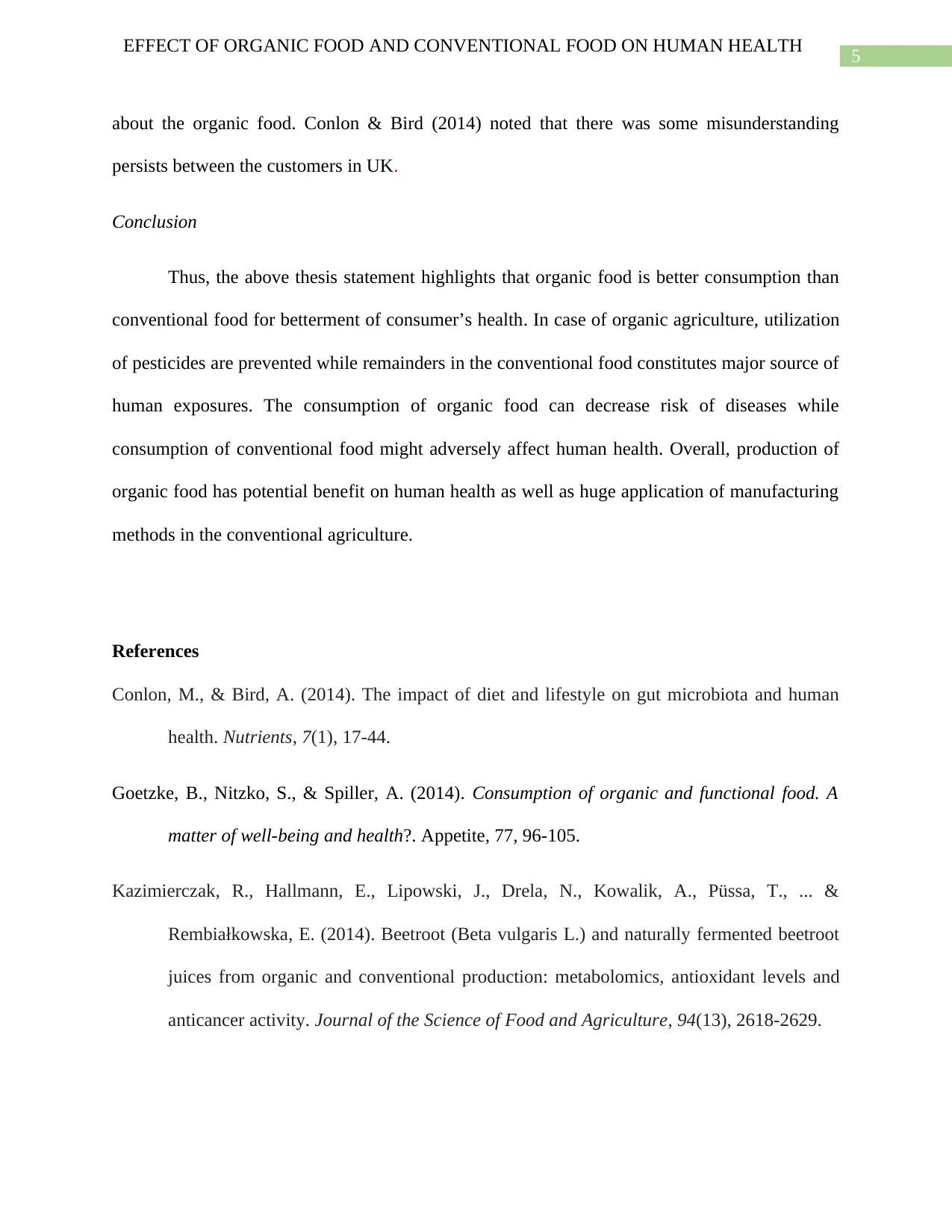
5
EFFECT OF ORGANIC FOOD AND CONVENTIONAL FOOD ON HUMAN HEALTH
about the organic food. Conlon & Bird (2014) noted that there was some misunderstanding
persists between the customers in UK.
Conclusion
Thus, the above thesis statement highlights that organic food is better consumption than
conventional food for betterment of consumer’s health. In case of organic agriculture, utilization
of pesticides are prevented while remainders in the conventional food constitutes major source of
human exposures. The consumption of organic food can decrease risk of diseases while
consumption of conventional food might adversely affect human health. Overall, production of
organic food has potential benefit on human health as well as huge application of manufacturing
methods in the conventional agriculture.
References
Conlon, M., & Bird, A. (2014). The impact of diet and lifestyle on gut microbiota and human
health. Nutrients, 7(1), 17-44.
Goetzke, B., Nitzko, S., & Spiller, A. (2014). Consumption of organic and functional food. A
matter of well-being and health?. Appetite, 77, 96-105.
Kazimierczak, R., Hallmann, E., Lipowski, J., Drela, N., Kowalik, A., Püssa, T., ... &
Rembiałkowska, E. (2014). Beetroot (Beta vulgaris L.) and naturally fermented beetroot
juices from organic and conventional production: metabolomics, antioxidant levels and
anticancer activity. Journal of the Science of Food and Agriculture, 94(13), 2618-2629.
EFFECT OF ORGANIC FOOD AND CONVENTIONAL FOOD ON HUMAN HEALTH
about the organic food. Conlon & Bird (2014) noted that there was some misunderstanding
persists between the customers in UK.
Conclusion
Thus, the above thesis statement highlights that organic food is better consumption than
conventional food for betterment of consumer’s health. In case of organic agriculture, utilization
of pesticides are prevented while remainders in the conventional food constitutes major source of
human exposures. The consumption of organic food can decrease risk of diseases while
consumption of conventional food might adversely affect human health. Overall, production of
organic food has potential benefit on human health as well as huge application of manufacturing
methods in the conventional agriculture.
References
Conlon, M., & Bird, A. (2014). The impact of diet and lifestyle on gut microbiota and human
health. Nutrients, 7(1), 17-44.
Goetzke, B., Nitzko, S., & Spiller, A. (2014). Consumption of organic and functional food. A
matter of well-being and health?. Appetite, 77, 96-105.
Kazimierczak, R., Hallmann, E., Lipowski, J., Drela, N., Kowalik, A., Püssa, T., ... &
Rembiałkowska, E. (2014). Beetroot (Beta vulgaris L.) and naturally fermented beetroot
juices from organic and conventional production: metabolomics, antioxidant levels and
anticancer activity. Journal of the Science of Food and Agriculture, 94(13), 2618-2629.
⊘ This is a preview!⊘
Do you want full access?
Subscribe today to unlock all pages.

Trusted by 1+ million students worldwide
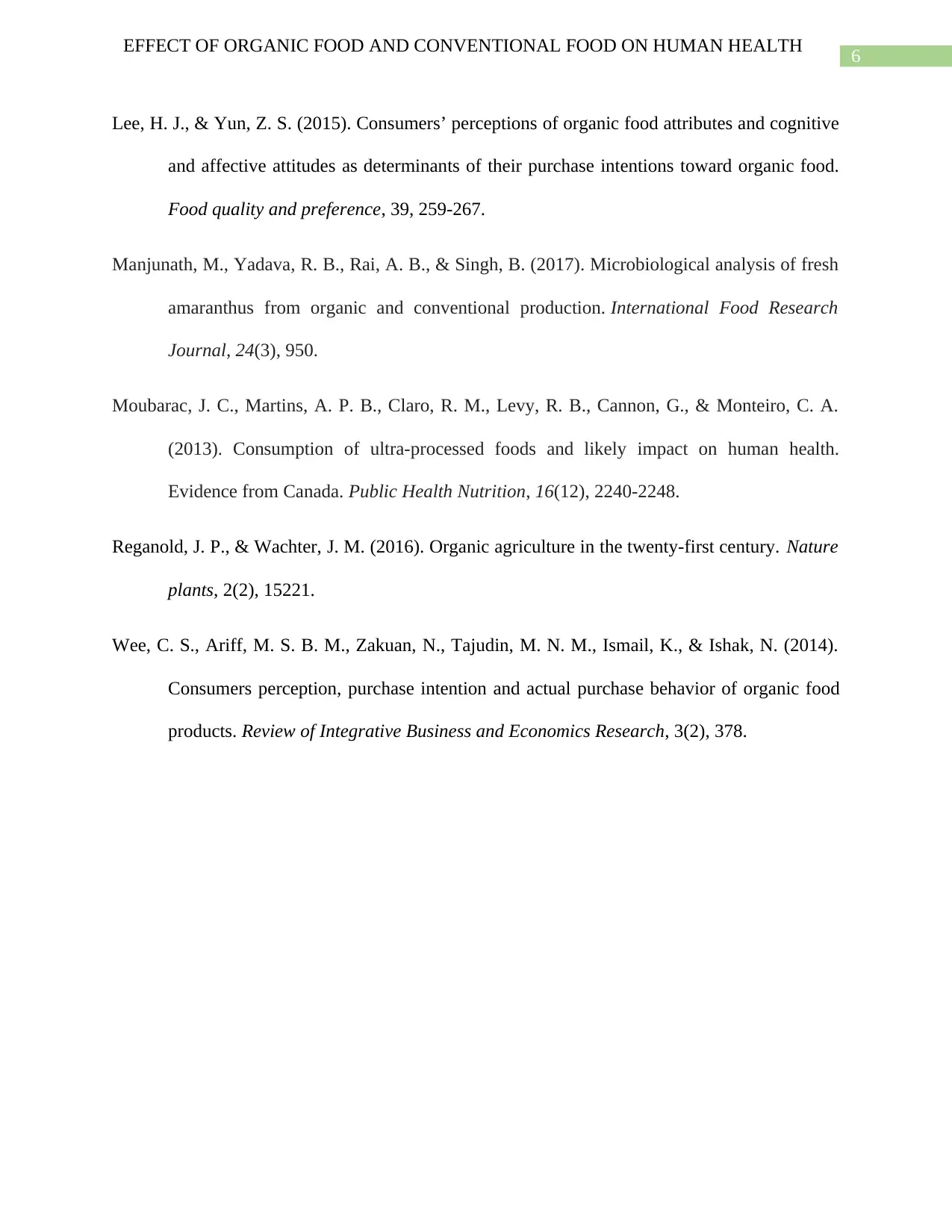
6
EFFECT OF ORGANIC FOOD AND CONVENTIONAL FOOD ON HUMAN HEALTH
Lee, H. J., & Yun, Z. S. (2015). Consumers’ perceptions of organic food attributes and cognitive
and affective attitudes as determinants of their purchase intentions toward organic food.
Food quality and preference, 39, 259-267.
Manjunath, M., Yadava, R. B., Rai, A. B., & Singh, B. (2017). Microbiological analysis of fresh
amaranthus from organic and conventional production. International Food Research
Journal, 24(3), 950.
Moubarac, J. C., Martins, A. P. B., Claro, R. M., Levy, R. B., Cannon, G., & Monteiro, C. A.
(2013). Consumption of ultra-processed foods and likely impact on human health.
Evidence from Canada. Public Health Nutrition, 16(12), 2240-2248.
Reganold, J. P., & Wachter, J. M. (2016). Organic agriculture in the twenty-first century. Nature
plants, 2(2), 15221.
Wee, C. S., Ariff, M. S. B. M., Zakuan, N., Tajudin, M. N. M., Ismail, K., & Ishak, N. (2014).
Consumers perception, purchase intention and actual purchase behavior of organic food
products. Review of Integrative Business and Economics Research, 3(2), 378.
EFFECT OF ORGANIC FOOD AND CONVENTIONAL FOOD ON HUMAN HEALTH
Lee, H. J., & Yun, Z. S. (2015). Consumers’ perceptions of organic food attributes and cognitive
and affective attitudes as determinants of their purchase intentions toward organic food.
Food quality and preference, 39, 259-267.
Manjunath, M., Yadava, R. B., Rai, A. B., & Singh, B. (2017). Microbiological analysis of fresh
amaranthus from organic and conventional production. International Food Research
Journal, 24(3), 950.
Moubarac, J. C., Martins, A. P. B., Claro, R. M., Levy, R. B., Cannon, G., & Monteiro, C. A.
(2013). Consumption of ultra-processed foods and likely impact on human health.
Evidence from Canada. Public Health Nutrition, 16(12), 2240-2248.
Reganold, J. P., & Wachter, J. M. (2016). Organic agriculture in the twenty-first century. Nature
plants, 2(2), 15221.
Wee, C. S., Ariff, M. S. B. M., Zakuan, N., Tajudin, M. N. M., Ismail, K., & Ishak, N. (2014).
Consumers perception, purchase intention and actual purchase behavior of organic food
products. Review of Integrative Business and Economics Research, 3(2), 378.
1 out of 7
Related Documents
Your All-in-One AI-Powered Toolkit for Academic Success.
+13062052269
info@desklib.com
Available 24*7 on WhatsApp / Email
![[object Object]](/_next/static/media/star-bottom.7253800d.svg)
Unlock your academic potential
Copyright © 2020–2026 A2Z Services. All Rights Reserved. Developed and managed by ZUCOL.





